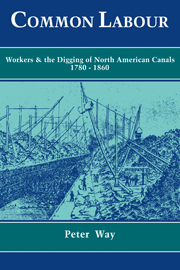Book contents
- Frontmatter
- Contents
- List of tables
- Acknowledgements
- Chronology of construction for main canals
- Abbreviations
- Map: Main canals of the North American Canal Era, 1780–1860
- Introduction
- 1 Early canals, 1780–1812
- 2 “As low as labor and capital can afford”: the contracting system, 1817–1840
- 3 “Human labor, physical and intelligent”
- 4 Payment “fit for labouring people”
- 5 The greatest quantity of labour
- 6 “Canawlers and citizens”
- 7 “Guerilla war”: labour conflict in the 1830s
- 8 “This new order of things”: the 1840s–1850s
- Conclusion
- Appendix 1 Tables 1–16
- Appendix 2 Tables 17–18
- Index
4 - Payment “fit for labouring people”
Published online by Cambridge University Press: 03 November 2009
- Frontmatter
- Contents
- List of tables
- Acknowledgements
- Chronology of construction for main canals
- Abbreviations
- Map: Main canals of the North American Canal Era, 1780–1860
- Introduction
- 1 Early canals, 1780–1812
- 2 “As low as labor and capital can afford”: the contracting system, 1817–1840
- 3 “Human labor, physical and intelligent”
- 4 Payment “fit for labouring people”
- 5 The greatest quantity of labour
- 6 “Canawlers and citizens”
- 7 “Guerilla war”: labour conflict in the 1830s
- 8 “This new order of things”: the 1840s–1850s
- Conclusion
- Appendix 1 Tables 1–16
- Appendix 2 Tables 17–18
- Index
Summary
I entered with them for a season, my monthly pay for to draw,
And being in very good humor, I often sang Erin Go Bragh.
Our provision it was very plenty, to complain we'd no reason at all,
I had money in every pocket, while working upon the canal.
Common labourers working on the Kanawha River for the James River Company in 1821 had to sign a contract outlining terms of employment. For its part, the Company promised to pay the agreed wages and to furnish “substantial & wholesome food, fit for labouring people, and such reasonable accommodations for lodging, he finding his own beding, as the season of the year may require.” In return, labourers agreed to work at least one month, and “to conduct themselves diligently, orderly & soberly, & with due & proper obedience to the manager or managers, Foremen, or directors of the work, so that the same may go on with regularity & dispatch.” If a labourer failed to behave in an acceptable manner he could be discharged at any time, while ten days' worth of his wages were retained as a security, “it being all important to the Company not to be impeded in their operations by improper conduct, or sudden desertions from their employment.” Similarly, the company managers wished to “secure the services of diligent and orderly mechanics in whom they can depend to remain steadily in their employment for such term as they may stipulate.” Skilled workers also gave their word to serve “diligently, orderly and soberly,” and to perform any job required when there was not enough work in their particular trade.
- Type
- Chapter
- Information
- Common LabourWorkers and the Digging of North American Canals 1780–1860, pp. 105 - 130Publisher: Cambridge University PressPrint publication year: 1993



